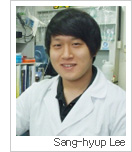To be researching Leukemia with 60 million won for the following 2 years
Hoping to become a world class expert in aging and cancer

Sang-hyup Lee (1st semester, masters•doctoral degree program, age 25), a graduate student majoring in Molecule Amalgamation Science has been selected for the Global Ph.D Fellowship, a world class Ph.D support grant offered by the National Research Foundation of Korea.
The Global Ph.D Fellowship is a support program of the National Research Foundation that helps students in doctoral degree programs or masters•doctoral degree programs to grow as the nation’s top minds with potential to bring renown to Korea in the future. The fellowship was first introduced in 2011, and this year a total of 200 fellows were selected.
Sang-hyup Lee is the first among Dankook University students to be selected. He will be receiving a grant from the government providing a stipend of 2.5 million won every month for the following 2 years for a total of 60 million won. Also, he will receive various benefits such as access to help from counselors and scholars, as well as building relationship with researchers in related fields.
We spoke with Lee, who mainly researches aging and cancer subjects.
We’ve heard that you are the first to be selected as a Global Ph.D fellow among Dankook University students. How do you feel about that?
I didn’t think I would be selected because the fellowship is usually offered to doctoral students only. However, since I had research results built up since my undergraduate years and because I had the support of my mentor professor, Eun-ju Kim, who helped with my up-to-date research patterns and research direction in related fields, I was able to apply with confidence. I am happy to be chosen, and I think I should execute my research with more responsibility. Also, I wish more DKU students could be selected for this program because it supports both domestic Ph.D students and combined masters•doctoral students.
I’ve heard you have been writing SCI research papers since you were an undergraduate student. Is that true?
I researched breast cancer cell aging. If you add a substance that can give stress to breast cancer cells, you will be able to see a process of cancer cell aging in the early stages. It is well-known that a protein named SIRT1 is active in this stage, but the fact that this protein is active when united with CBX8 was not known at all.
I was the first to investigate and proclaim that the proteins SIRT1 and CBX8 interact in the aging of cancer cells. With my results, I published my research paper in Cancer Letters (IF: 4.238), a famous international academic journal on cancer.
What is the secret of achieving good research results?
I have a tendency to lose interest easily in everything. While thinking about my future career, I participated in the Undergradate Research Program (URP Program) operated by my major department in my 3rd year of undergraduate studies, and this field interested me a lot, making researching fun for me.
From my undergraduate times, I headed a lab directly after class and focused on experiments. I think that led to the positive outcome. As a matter of fact, I am still repeating my daily life of coming to the lab at 9 am in the morning and going home after 11 pm. I think it is the same for every researcher, so I believe what they need is consistent interest and passion.
What research are you currently working on?
I am currently researching new interactivity of the two proteins CBX8 and SIRT1 in the initiation stage of Leukemia, as I thought they may function together in other types of cancer just as they did in the aging of breast cancer cells shown in my previous research. If I can find a new machanism of Leukemia initiation, I believe it will be a huge contribution to Leukemia treatment in the future.
What is your future plan?
First of all, I am planning to focus on my current research that I am working on with government support. Once I finish the Ph.D program, I am thinking of executing more professional research through a post-doc. My final goal is to become an expert who can stand beside the world famous scholars in my research field.